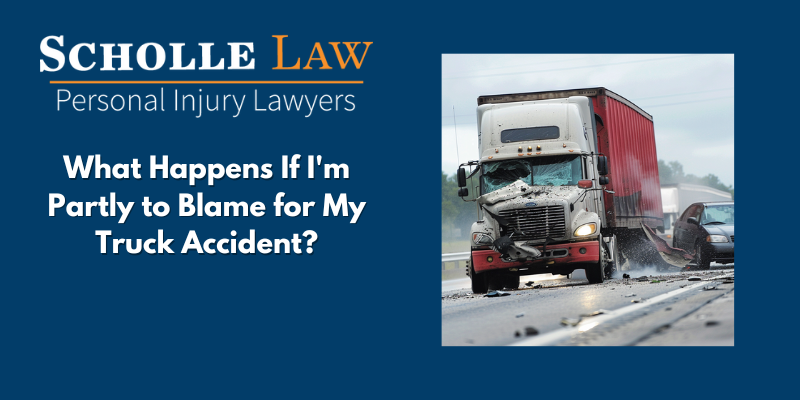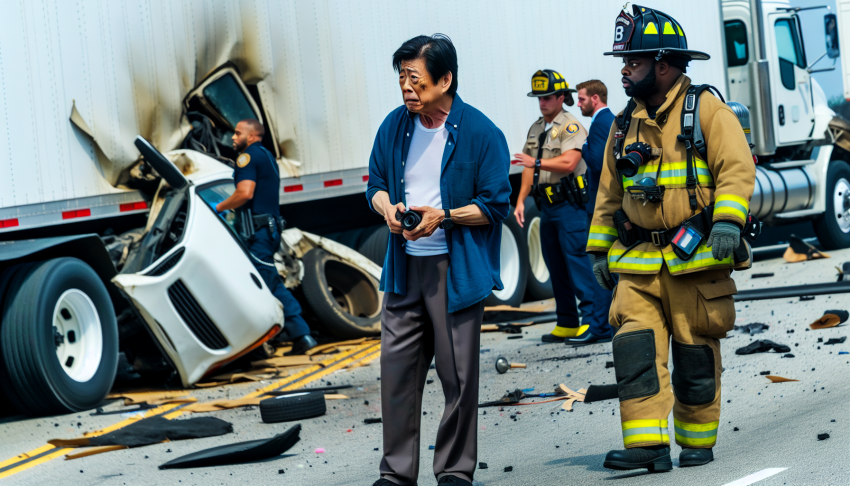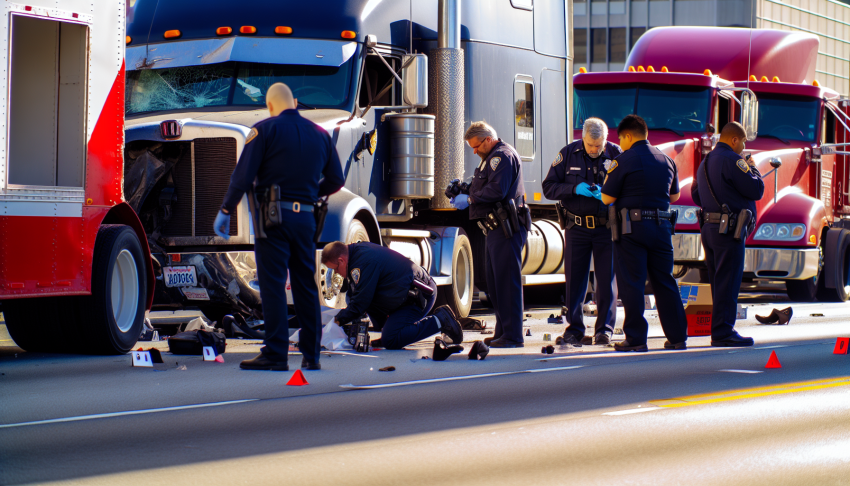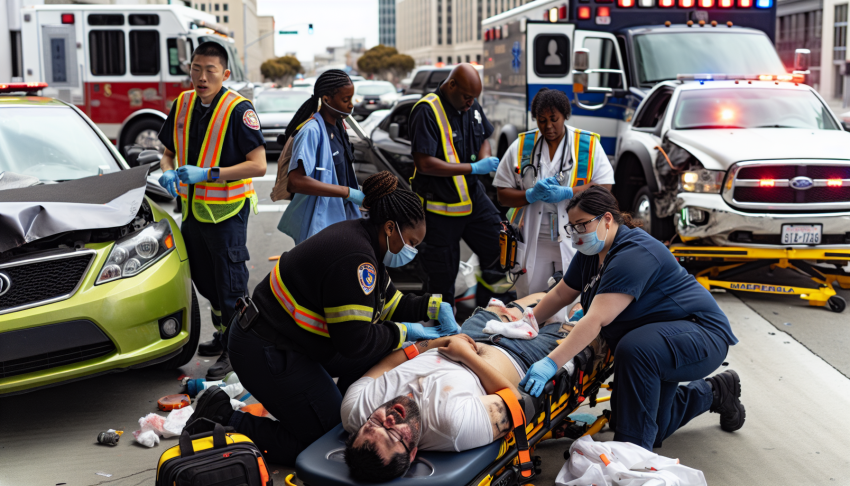4.9 Rating
Google REVIEWS
Leaders in Georgia Personal Injury Law Since 1995
What If I'm Partly to Blame for My Truck Accident?
Wondering ‘what if I’m partly to blame for my truck accident’ can lead to a maze of legal questions – but Georgia’s laws offer clarity. In this article, we navigate the concept of comparative negligence and its effect on your claim. We aim to empower you with knowledge about your right to compensation, even when you share fault, and the pragmatic steps you can take towards a fair settlement.

Key Takeaways
- Georgia’s modified comparative negligence doctrine allows accident victims to recover damages even if partially at fault, as long as their fault is less than 50%, with compensation reduced by their fault percentage.
- Insurance companies play a pivotal role in determining fault based on negligence and employ tactics to minimize payouts, stressing the need for legal representation to ensure fair compensation.
- Victims partly at fault for truck accidents can still be eligible for compensation for various damages, and misconceptions about partial responsibility should not deter them from pursuing legal claims.
Understanding Shared Fault in Truck Accidents in Georgia
In Georgia, as elsewhere, the question of fault is central to any truck accident case. The concept of negligence, referring to a failure to exercise appropriate care on the road, is often the linchpin in these cases. But what happens if you, the victim, are found to be partially responsible? Do you still have a shot at compensation? The answer lies in Georgia’s “apportionmen” laws. This is codified in O.C.G.A. 51-12-33, Georgia’s apportionment statute, which is also modified comparative fault.
Where an action is brought against one or more persons for injury to person or property and the plaintiff is to some degree responsible for the injury or damages claimed, the trier of fact, in its determination of the total amount of damages to be awarded, if any, shall determine the percentage of fault of the plaintiff and the judge shall reduce the amount of damages otherwise awarded to the plaintiff in proportion to his or her percentage of fault. OCGA 51-12-33(a)
Georgia follows a system known as “modified comparative negligence”. This legal principle allows a victim to recover damages even when partially responsible for a truck accident. However, the compensation is reduced by the victim’s percentage of fault. For instance, if you’re found to be 30% at fault, your compensation will be reduced by 30%.
In Georgia, a party can still recover damages if they are less than 50% at fault for the accident. Therefore, even if you’re partly to blame, don’t lose hope. A knowledgeable truck accident lawyer can help navigate these complexities and guide you towards a fair settlement.
The Basics of Comparative Negligence and Georgia’s Apportionment Statute.
Comparative negligence may sound like a complex legal term, but its application is rather straightforward. Essentially, it considers the actions of both parties involved in an accident to determine each party’s share of the fault. In the case of a truck accident, this could involve assessing the truck driver’s adherence to regulations, their fatigue levels, and any potential distractions. Additionally, it would also consider your actions as a car or truck driver.
Pure and modified are the two categories that the comparative negligence doctrine is divided into. Under pure comparative fault laws, a party involved in a truck accident can recover damages even if they are up to 99 percent at fault, with the recovery amount being proportional to the determined liability. This infers that, despite being majorly at fault, there’s still a chance for you to receive some compensation. However, Georgia adheres to a more restrictive version of this principle known as “modified comparative negligence”.
Under modified comparative fault, there’s a limit to the ability to recover damages if a party’s fault exceeds a certain threshold, commonly 50 or 51 percent. In Georgia, if you’re found to be 50% or more at fault, your compensation may be significantly reduced or even denied. Hence, having a comprehensive understanding of these principles or seeking guidance from an experienced personal injury lawyer is vital.
Contributory Negligence: A Rarer Doctrine
While comparative negligence considers the level of fault on both sides, contributory negligence operates on a stricter basis. This doctrine can bar a person from recovering any damages if they are found to be even 1% at fault in an accident. While this may sound daunting, in Georgia, the landscape is a bit different.
Georgia follows a modified comparative negligence doctrine rather than pure contributory negligence for truck accident cases. This means that you can recover damages in a lawsuit if you are less than 50% at fault for the accident. Nevertheless, your fault percentage will diminish the compensation you receive. For example, if you’re found to be 30% at fault, you would only receive 70% of the awarded damages.
However, there are exceptions to contributory negligence. Recovery under contributory negligence statutes can be permissible if the conduct of the other party involved involved willful or intentional misconduct. Hence, regardless of your partial fault, a seasoned truck accident attorney can assist in exploring all potential legal routes for compensation.

Evaluating Your Part in the Accident
Understanding your part in a truck accident is crucial to navigate the legal landscape. Several factors can influence the determination of partial blame. Poor truck braking capability, truck driver fatigue, and distracted driving are common contributors to truck accidents. Each of these factors requires careful consideration.
Distracted driving is a major contributing factor in truck accidents. Activities that divert attention from the task of driving, such as using in-cab technologies irresponsibly or eating while driving, can increase the risk of accidents and shared blame. Similarly, driver fatigue reduces cognitive function and impairs the ability to react quickly to road conditions, increasing the risk of accidents and shared blame. Hence, while assessing your role in an accident, it’s vital to be mindful of these factors.
However, your conduct is also under scrutiny. Specific driving behaviors that can lead to disqualification of a commercial driver’s license (CDL) and increase your fault in an accident include:
- Excessive speeding
- Erratic lane changes
- Following too closely
- Distracted driving
Major violations such as driving under the influence or using a vehicle to commit a crime can also significantly impact the assignment of fault. Hence, assessing your actions and their potential contribution to the accident is of paramount importance.
How Insurance Companies Assess Fault
Insurance companies play a significant role in truck accidents. They determine fault using the legal principle of negligence, based on a driver’s failure to adhere to their duty of care. This involves considering eyewitness accounts, citations for traffic violations, and the use of cell phones leading up to the accident. However, it’s important to remember that insurance companies’ primary aim is to reduce payouts and maintain profitability.
Insurance companies employ strategies such as:
- Questioning claimants carefully to find any evidence of their liability
- Using delay tactics to pressure settlement
- Casting doubt on your version of events
- Questioning the severity of your injuries
- Suggesting that you were partly to blame
Hence, having a well-versed truck accident lawyer to contest the insurer’s fault evaluation and negotiate for you is of utmost importance.
Keep in mind that Georgia laws, including those on contributory and comparative fault, affect the distribution of compensation in cases of shared fault. A skilled truck accident attorney can help navigate these complexities and ensure that you receive fair compensation, even if you’re partly at fault.

The Role of Evidence in Proving Liability
Evidence plays a crucial role in establishing liability after a truck accident. It includes:
- Police reports
- Photos
- CCTV footage
- Eyewitness statements
Each type of evidence serves a unique purpose in the legal process and can significantly influence the outcome of your truck accident case.
Witnesses, for example, can provide crucial details about the accident, including traffic light status, vehicle speed, and driver behavior, which can indicate who was at fault. Police reports, while not definitive in court, are key in determining which driver was more careless. Hence, gathering as much evidence as possible at the accident spot is vital.
Another vital piece of evidence is the black box data from the truck. It can offer critical information such as the truck’s speed and brake application before the collision, contributing to the liability assessment. Hence, engaging a seasoned truck accident attorney at an early stage is pivotal to ensure the collection and preservation of all significant evidence.
Legal Representation: Your Ally in Complex Cases
Having a knowledgeable lawyer like Scholle Law Car & Truck Accident Attorneys, is crucial when the victim is partly at fault in a truck accident. We can provide strategies to minimize the client’s liability. An experienced truck accident attorney ensures the victim’s right to fair compensation by gathering evidence, challenging the insurer’s fault assessment, and negotiating with insurance companies.
Early consultation with a truck accident lawyer helps the victim understand their legal rights and options. They guide victims through the complexities of the settlement or legal process. This guidance is invaluable in navigating the labyrinth of legal procedures and ensuring that your rights are protected.
An experienced truck accident attorney can:
- Advise you on how to respond to insurance companies and other parties involved in the accident
- Help debunk common misconceptions about partial responsibility in truck accidents
- Provide you with the confidence to face the challenging road ahead.
Building a Strong Truck Accident Claim
Building a strong truck accident claim requires meticulous attention to detail and a strategic approach. An experienced truck accident attorney plays a pivotal role in this process. They collect important evidence such as:
- In-cab camera footage
- Driver logbooks
- Maintenance records
- Personnel records
This evidence is used to establish liability and minimize the client’s fault.
Crafting a solid legal strategy for negotiation and mediation is equally crucial. This begins with a thorough investigation of the accident and may include discussions with the trucking company’s insurance carrier. This strategic groundwork sets the stage for a strong truck accident claim.
In the event of a trial, litigation requires resilience. A methodical legal approach and expert courtroom presentation are necessary for achieving a successful verdict. The attorney’s preparation is bolstered by a carefully selected team of dedicated experts, ensuring comprehensive attention to the client’s legal, physical, and mental needs through the duration of the claim and litigation process.
Negotiating with Trucking Companies and Insurers
Negotiating with trucking companies and insurers is a critical step in the legal process. However, it demands a keen understanding of insurance companies’ intent to reduce payouts, which is vital during negotiations. An experienced truck accident attorney can guide you through this process, ensuring that you’re not disadvantaged.
Effectively handling communications and negotiations requires:
- Sticking strictly to the facts
- Having an attorney manage all interactions
- Knowing the claim’s estimated value to avoid lowball offers from insurance companies
- Counseling patience and advising against accepting the first offer
Moreover, obtaining written documentation during negotiations is essential to avoid misunderstandings and provide evidence for the attorney’s case review. Therefore, the role of an experienced truck accident attorney extends beyond legal representation. They are your ally, advocate, and advisor in this complex process.
Litigating for Fair Compensation
When an insurance company fails to offer a fair settlement, it may be necessary to take the matter to court. An attorney must file a lawsuit within the statutes of limitations to protect the client’s rights. This step marks the onset of a legal battle that requires resilience and a strong legal strategy.
The legal procedures in truck accident cases are often long and complex, necessitating a lawyer with specialized experience in trucking litigation to manage the process effectively. During a truck accident trial, the following steps are typically involved:
- Opening statements from both parties
- Presentation of evidence
- Closing arguments
- Deliberation by the judge or jury
- Verdict
It is important to have a knowledgeable attorney who can navigate these steps and advocate for your rights in a truck accident case.
A skilled lawyer can:
- dispute the degree of fault attributed to a client in court, which may allow for the recovery of damages, even when the client is partly at fault for the accident
- litigate for fair compensation
- safeguard your rights
This highlights the importance of having an experienced truck accident attorney, especially in cases involving a trucking accident or a car accident as well.
Financial Recovery and Partial Fault
Even if a driver is partially at fault, they may still be eligible to recover damages depending on the state’s negligence laws and their percentage of fault. The compensation amount may be reduced by the percentage of fault assigned to the victim by the court. This means that, even if you’re partly at fault, you could still receive some compensation.
Truck accident victims with partial fault can receive compensation for various damages, including truck accident injuries, such as:
- Medical bills
- Lost time at work
- Cost of long-term recovery needs
- Pain and suffering
- Emotional distress
- Loss of quality of life
- Loss of consortium
Hence, having a comprehensive understanding of these principles or seeking guidance from an experienced personal injury lawyer is vital when pursuing a personal injury claim.
However, there’s a misconception that accidents involving big trucks automatically result in bigger compensation, but the settlement amount depends on various factors beyond the size of the truck or its insurance policy. So, even if you are partially to blame, don’t despair. A proficient truck accident lawyer can assist in steering through these complexities and guide you to a fair settlement.

Steps to Take Immediately After a Truck Accident
The moments following a truck accident can be chaotic and stressful. Nevertheless, remaining focused and taking certain measures to safeguard your rights are vital. First, document the accident scene by taking photos of the vehicles, road conditions, and any relevant environmental factors, and collect contact information from witnesses and all parties involved, including trucking company details.
Next, notify local law enforcement to file an official report, and do not delay legal action due to statutes of limitations and potential degradation of evidence. Also, seek medical treatment right away for any injuries, which can also uncover late-onset issues and support the injury claims in the accident case.
Lastly, avoid repairing the vehicle immediately; have it appraised as part of the insurance claim to document damage accurately. These steps, while seemingly basic, can significantly impact your truck accident claim and the potential compensation you could receive.
Misconceptions About Partial Responsibility in Truck Accidents
Common misconceptions about partial fault in truck accidents can lead to unnecessary stress and hinder recovery of compensation. One such misconception is that being partly at fault for an accident automatically excludes someone from bringing a lawsuit or recovering damages.
However, this is not always the case. Even if you’re partly at fault, you may still be eligible to bring a lawsuit or recover damages. Victims partly at fault still have various legal options available, making it possible to seek and potentially obtain compensation. So, even if you’re partially to blame, don’t despair. A proficient truck accident attorney can dispel these misconceptions and steer you towards the most favourable outcome.
The Impact of Out Of State Laws on Truck Accident Claims
The outcome of a truck accident claim involving partial fault can be significantly influenced by various factors. One such factor is the specific state laws. For instance, in the United States, 13 states follow the pure comparative fault system, while 32 states practice modified comparative fault in negligence cases.
Under pure comparative negligence, a plaintiff may recover damages even if they are 99% at fault, with their recovery reduced by their own fault percentage. However, in states that adopt the modified comparative negligence rule, recovery is barred if a plaintiff’s fault reaches or exceeds a certain threshold, commonly 50 or 51 percent.
Therefore, factors such as the specific state laws, the details of the accident, and the strength of legal representation significantly influence the outcome of a truck accident claim when a party is partly at fault. Thus, collaborating with a proficient truck accident lawyer who comprehends these complexities and can effectively champion your rights is critical.
Summary
In conclusion, understanding liability in a truck accident is a complex process, especially when the victim is partly at fault. However, with the right legal guidance and a thorough understanding of Georgia’s negligence laws, victims can potentially recover damages and navigate the legal landscape with confidence. Remember, even if you’re partly at fault, you still have legal options. A knowledgeable truck accident attorney can help debunk misconceptions, navigate the complexities of insurance negotiations, and advocate for your rights.
Frequently Asked Questions
Can I successfully recover for my injuries and damages?
It may be challenging to claim for injuries and damages from the other party’s insurance if the accident was deemed your fault in a fault state. However, you can explore using your own insurance, depending on your policy and coverage limits.
Can someone blame me for a car accident that wasn't my fault?
Yes, someone can try to blame you for a car accident, but with the right evidence and support, you can defend your innocence, whether through legal proceedings or insurance dispute resolution.
Can I still recover damages if I am partly at fault in a truck accident?
Yes, you can still recover damages if you are partly at fault in a truck accident, as long as you are less than 50% at fault, but the compensation will be reduced by your percentage of fault. This reflects the principles of Georgia’s modified comparative negligence doctrine, which aims to allocate damages in a way that corresponds to each party’s level of responsibility for the accident.
It’s a system designed to ensure fairness, so that even if you have contributed to the cause of the accident, your right to compensation is preserved, albeit adjusted to reflect your share of the blame. Therefore, if you were found to be 30% responsible, your total recoverable damages would be reduced by 30%, allowing you to still receive 70% of the awarded damages. It’s important to understand that this rule underscores the importance of a thorough investigation to accurately determine fault percentages, as this will directly affect the outcome of your claim.
What role does evidence play in proving liability in a truck accident?
Evidence such as police reports, photos, CCTV footage, and eyewitness statements is crucial in establishing liability after a truck accident. It plays a fundamental role in proving who is at fault.
What steps should I take immediately after a truck accident?
After a truck accident, it’s crucial to document the scene, seek medical attention, notify law enforcement, and refrain from immediate vehicle repairs to accurately document damages. Taking these steps will help ensure a smooth process in handling the aftermath of the accident. And, most importantly, contact an experienced trucking firm, like Scholle Law, immediately so that we can begin taking steps to safeguard your case.
